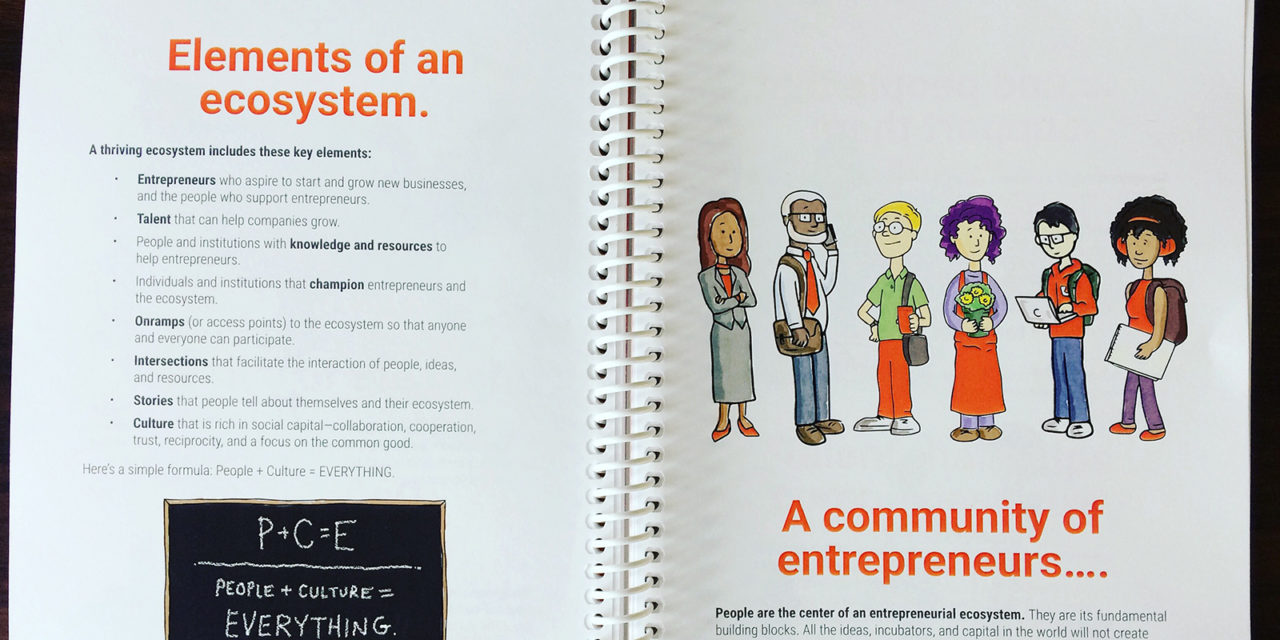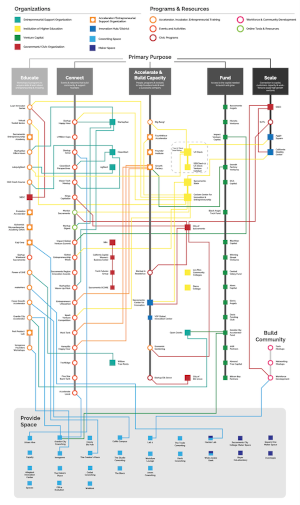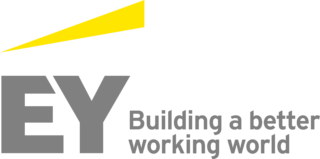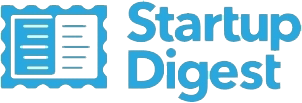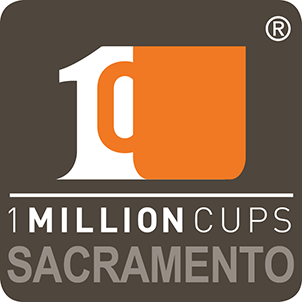In June, StartupSac cofounder Laura Good traveled to Kansas City to attend the EShip Summit, the Kauffman Foundation’s three day event convening diverse entrepreneurial ecosystem builders working to empower entrepreneurs and innovators in their communities. On her return she shared with me a copy of The EShip Summit Playbook, that, with some much needed holiday downtime, I finally had a chance to go through.
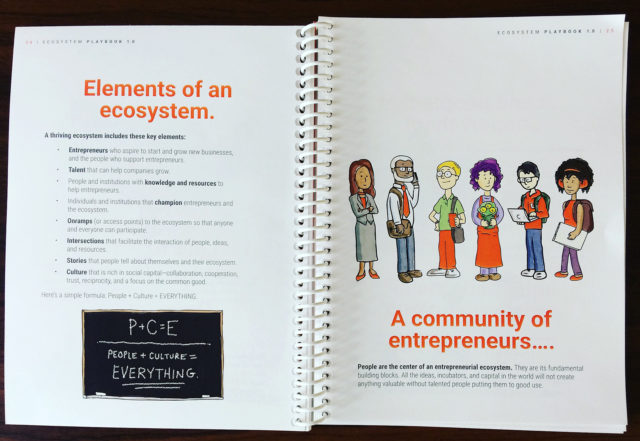
There’s a lot of great information in this little booklet that we can apply to assessing and building our startup and innovation ecosystem here in the Sacramento region. On page 24, the playbook highlights what they posit are the key elements of a thriving entrepreneurial ecosystem:
- Entrepreneurs
- Talent
- Knowledge and Resources
- Champion
- Onramps
- Intersections
- Stories
- Culture
These elements provide a useful lens to examine and assess Sacramento’s ecosystem.
1. Entrepreneurs
“People are the center of an entrepreneurial ecosystem.”
The first element they define is that communities need a vibrant supply of entrepreneurs who aspire to start and grow businesses. If you spend any time out in the startup community here, it’s pretty easy to see that we have a robust supply of people with entrepreneurial aspirations. The weekly 1 Million Cups Sacramento meetings are a great example of this. Since launching in September of 2016, we’ve had over 100 founders present their startup ideas on Wednesday mornings.
You can also get a good feel for the entrepreneurial pipeline by attending events like Startup Grind, and tuning in to pitch competitions like Kings Capitalize and Startup Weekends. In regards to this element, I think we’re pretty healthy, but we can certainly do more to encourage more people with aspirations and to support those who have already on their entrepreneurial journey.
2. Talent
“Some of the nation’s most successful entrepreneurial ecosystems are also talent magnets and incubators.”
The second element cited in the playbook is that communities need talent that can help companies grow. In the words of the playbook, “the most successful ecosystems are talent magnets and incubators.” This means both attracting from outside the region as well as cultivating and retaining talent it locally.
In my time in the local startup community I get mixed signals with regard to our tech talent availability. On one hand I’ve heard startup founders tout the local talent pool, citing no issues in being able to find talent. Yet I’ve also heard others talk about it as a challenge. My takeaway is that how well Sacramento rates for talent depends on what people are looking for. One thing that is consistent in what I hear is that workers for startups here are more loyal since there’s not a culture of aggressive poaching and competition like there is in the Bay Area.
Also related to talent, there’s been some promising signals recently. Incoming UC Davis Chancellor Gary May has publicly stated his desire to connect Davis to Sacramento’s downtown core. This has also been echoed by Sacramento Mayor Darrel Steinberg. Additionally, the Mayor’s Office for Innovation and Entrepreneurship (MOFIE) has kicked off their Sacramento Urban Technology Lab (SUTL) vision, with a key component of that being the Triple Helix concept of strong relationships between universities, industry, and government.
The recent donation of $600 million from Dale Carlsen to fund the Dale and Katy Carlsen Center for Innovation and Entrepreneurship at Sacramento State is another strong investment in our community growing its talent base and represents a commitment from local successful business leaders to innovation and entrepreneurship in our region.
3. Knowledge and Resources
“Strong ecosystems allow entrepreneurs to quickly find knowledge and resources they need to succeed.”
For an ecosystem to thrive, entrepreneurs need to be able to quickly find the knowledge and resources that they need in order to be successful. They need to know where that exists and what resources are available to them. This element is at the core of why StartupSac and this website exist. When we launched the website in October 2015 there was no one online resource hub where people could go to find a listing of events or what coworking spaces, accelerator, and incubators are available in the region. There was no listing of the VCs and angel investor funds in the area and no directory of local startups. Over the 2+ years the site has been up, the set of resources has grown and we hope to continuously add to and enhance what’s available here.
In addition to this website, a resource navigator funded by a Slingshot grant is currently under development by a team at the Sacramento iHub. This resource navigator will go beyond what we have on this site by covering a broader geographic region as well as more service providers and organizations helping small and medium businesses.
4. Champions
“Champions and conveners promote entrepreneurs, organize the ecosystem, and build awareness.”
Another core element from the playbook that is at the core of StartupSac’s mission is the role of champions – those who promote and convene entrepreneurs, help to build and organize the ecosystem. We’re certainly not alone in this role however. Coworking spaces like The Urban Hive and Hacker Lab are catalysts and connectors of entrepreneurs in our ecosystem. Rich Foreman and his monthly Startup Grind events are a great for bringing people together and making those connections as well. Our local Startup Weekend and 1 Million Cups organizers work relentlessly to help entrepreneurs. And it doesn’t end there. In fact, I think one of the greatest assets of our startup community here is just how many people there are who actively cheer on and support our entrepreneurs, whether that’s through social media, organizing events, or just being supportive at events, Sacramento is chock full of champions.
5. Onramps
“Onramps make ecosystems more open.”
Healthy ecosystems need to be easily accessible to new entrants. They need to be able to easily find the community and join it. Many of the champions listed above also serve as the role as onramps into the Sacramento startup community. Startup Grind and other regular events and meetups are a great way for those new to the community to dive in. The weekly 1 Million Cups startup presentations every Wednesday morning are another key Sacramento onramp into our community.
6. Intersections
“Collisions between people, ideas, and resources often allow entrepreneurs to find missing pieces of the puzzles they are trying to solve.”
It’s often stated that random collisions between entrepreneurs and innovators, often from distinctly different industries or disciplines are key to strong innovation economies. Ecosystems should “engineer serendipity” between disparate elements of the network by creating opportunities where intersections between people, ideas, and resources can happen. An oft cited example of this is Technology Square in Atlanta, an “urban mixed-use development encompassing education, research, hospitality, office, retail, and residential areas. It is a destination for startup firms, incubators, established technology firms, major corporate offices, corporate innovation centers, venture capital investors, and business service providers.”
Here in Sacramento, our coworking spaces are currently our best intersection resource. But there’s a concerted effort to engineer more such opportunities. Brandon Weber of the Urban Hive and I/O Labs has hopes that I/O Labs can serve such a role. UC Davis Chancellor Gary May, Sacramento Mayor Darrel Steinberg, and Chief Innovation Officer Louis Stewart are all keenly aware of the innovation synergy that happens in places like Atlanta’s Tech Square and have expressed a vision to create such an environment in downtown Sacramento. It was a key part of Chancellor May’s remarks at the Sacramento Region Innovation Awards in November when he invited the audience to,”Imagine an innovation ecosystem in the urban core of Sacramento. Imagine this hub as an extension of the UC Davis campus, one that links the world-renowned research, faculty, and students with local businesses.”
But obviously something like that is going to take years to develop. So what can we do here in the short term to increase the innovation serendipity quotient? Increasing the number of pitch competitions, conferences, and events like Innovate Sac and Impact Global Venture Summit seem like reasonable places to start.
7. Stories
“The collective story that people tell themselves – and the rest of the world – powerfully shapes an ecosystem’s future.”
Not to keep tooting our own horn, but this is again a role that StartupSac aims to fill. By reporting news and events, publishing interviews and podcasts we are telling the story of the Sacramento startup ecosystem as it evolves. But we’re not alone. The Greater Sacramento Economic Council is actively promoting startup success stories. The Sacramento Business Journal has done an admiral job, especially in the last year or so in reporting on the startup scene. Comstock’s Magazine has increased it’s efforts to tell the stories of our local startups through feature articles and their Startup of the Month column. SacTown Magazine has also made forays into telling the stories of our local innovators and entrepreneurs.
8. Culture
“Culture makes the ecosystem come alive. We find culture in a community’s energy, it’s attitude toward collaboration and competition, and its enthusiasm for entrepreneurship.”
Back in September of 2014 I attended a Startup Expo event at Hacker Lab in Midtown. At that event, Brian Collins, from Angel Hack stood on a table and in a rousing talk state, “In Sacramento, we’ve created a true Incubation Island, a place where ideas flow freely and openly with little fear of reprisal or backstabbing. We have a place where anyone with an idea can come and build it out. If they go somewhere else, great because their roots will always be here.”
That event was my first experience with the Sacramento startup ecosystem and it was clear to me right then that this was a culture that I wanted to be a part of and help to shape. Our startup culture here is shaped by smart, driven, collaborative founders and innovators as well as the great vibe of and people of Sacramento. In fact, I’d say that I think our culture here is the greatest strength of our ecosystem. And I’m willing to bet I’m not alone in that sentiment.
If you’d like to check out the playbook in full for yourself, it’s available online for review and commenting. It’s a quick, short read and just might inspire you with some new ideas to contribute to our ecosystem. And when you do come up with those ideas, please share them with us so we can share them with the rest of the community.
Related:
4 Low-cost Ways to Impact Your Startup Ecosystem
What a Startup Ecosystem Needs to be Successful: A Compendium

